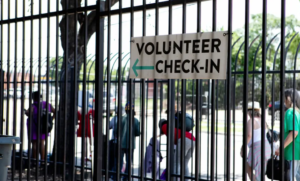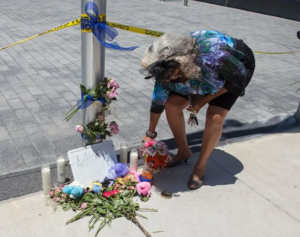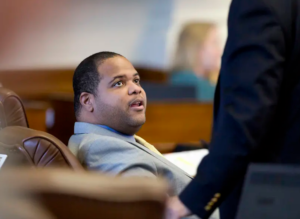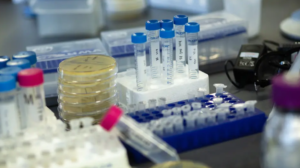Donald Trump cautions against “falsely labeling” racists while in Dallas to talk about George Floyd

President Donald Trump, speaking Thursday in Texas, began to describe his administration’s policy response to some of the issues raised by the massive George Floyd protests while downplaying police officers who abuse their power as “bad apples” and cautioning against “falsely labeling” many Americans as racist.
Trump made the remarks in Dallas during a roundtable discussion on policing ahead of a fundraiser for his reelection effort that was expected to rake in over $10 million. At the roundtable, Trump said he was “announcing four steps to build safety and opportunity and dignity” after the death of Floyd, the black Minnesota man who died late last month after a white police officer kneeled on his neck for nearly nine minutes.
While light on details, Trump said his plan centered on economic development in black and Latino communities — going “above” the federal Opportunity Zones program — and investing “substantial sums” in medical institutions that serve communities of color. He added he was finalizing an executive order that would encourage police departments nationwide “to meet the most current professional standards for use of force, including tactics for deescalation.”
Trump largely expressed deference to police, arguing that there are “bad apples” but “not too many of them,” and stuck to a law-and-order focus, adjusting a previous statement to say America is “dominating the streets with compassion.”
“We have to work together to confront bigotry and prejudice wherever they appear, but we’ll make no progress and heal no wounds by falsely labeling tens of millions of decent Americans as racists or bigots,” Trump said. “We have to get everybody together.”
Trump has struggled so far to offer a consistently unifying response to Floyd’s death and the massive protests it has caused, most notably walking to a church near the White House earlier this month to pose with a Bible after a forced clearing of peaceful demonstrators. And his comments urging racial unity Thursday come toward the end of a first term during which he has inflamed tensions that have fueled the protests, with polls showing most Americans believe he has made race relations worse.
He continued to strike a combative tone Thursday, denouncing a push by some activists to “defund the police” — a movement that largely refers to reducing police department revenues in favor of increasing funding for social services — and railing against Seattle over an “autonomous zone” that protesters have taken over. He said such a revolt could never happen in Texas and that leaders such as Gov. Greg Abbott and Lt. Gov. Dan Patrick “would solve it very easily.”
Democrats harshly criticized Trump’s swing through Texas on two fronts, arguing that it only further highlighted his administration’s inadequate response to the pandemic and Floyd protests. On Thursday morning, Trump’s presumptive Democratic challenger, Joe Biden, released a statement saying that the president is “more interested in photo-ops than offering a healing voice as our nation mourns.”
Even before he touched down in Dallas, Trump also faced scrutiny for not including in the roundtable three top area law enforcement officials who are black: Dallas Police Chief U. Reneé Hall, Dallas County Sheriff Marian Brown and Dallas County District Attorney John Creuzot. Dallas Mayor Eric Johnson, who is also black, was invited, according to his office. But Johnson did not attend.
The roundtable did include Vernell Dooley, the black police chief of Glenn Heights, a small city south of Dallas.
The event took place at the Dallas campus of Gateway Church, whose founder, Pastor Robert Morris, has served as a Trump religious adviser.
Afterward, Trump attended a reelection campaign fundraiser at a private home in Dallas, where couples were asked to give $580,600 each. About 25 people were expected to attend. Kelcy Warren, the pipeline billionaire and top Texas GOP donor, hosted the fundraiser, according to Bloomberg.
The event marked Trump’s first in-person fundraiser since the pandemic upended campaigning months ago. Organizers said they were taking precautions to prevent the spread of the virus by doing things like ensuring every attendee tests negative for the virus the day of the event.
Trump is also resuming in-person rallies, starting with one June 19 in Tulsa, Oklahoma. His campaign announced the rally while he spoke in Dallas, including a disclaimer on the RSVP form that says attendees acknowledge the “inherent risk of exposure to COVID-19” and will not hold any of the parties involved liable if they contract the virus. Trump’s Dallas roundtable had an audience approaching 2,000 people. A White House pool report said the room’s capacity was 1,830, and it was “close to full.”
U.S. Rep. Colin Allred, D-Dallas, called Trump’s visit a “slap in the face,” particularly during the state’s battle against the coronavirus.
“I find it to be insulting to the people in Texas who can’t get tested for COVID, for the long-term care facilities that are still experiencing these crises, for our essential workers who make up such a high percentage of our hospitalization, not only for the president coming to Dallas for a fundraiser, but to be making sure that everyone who gets into that fundraiser does have a COVID test,” Allred said during a morning conference call with reporters.
Other Democrats expressed hope that Trump would show some interest in parts of the police reform outline that they unveiled Monday in Congress. During a Texas Democratic Party call ahead of Trump’s visit, U.S. Rep. Marc Veasey of Fort Worth noted that House Democrats are pushing to outlaw chokeholds.
“We’ve seen this time and time again, where an African American male suspect that have had encounters with police and police who use chokeholds unnecessarily, and it’s resulted in death,” Veasey said.
Trump did not mention that proposal Thursday, though he spoke broadly about the need to “invest more energy and resources in police training and recruiting and community engagement.”
As for the criticism of the timing of Trump’s trip, U.S. Sen. John Cornyn brushed it off as partisan posturing during a conference call with reporters earlier Thursday afternoon.
“People are gonna try to politicize everything President Trump does … but he’s certainly welcome in Texas as far as I’m concerned,” said Cornyn, who is holding his own policing roundtable Friday in Dallas with Johnson.
While Trump’s Dallas event was billed as a response to the unrest after Floyd’s death, the president hada couple of extended tangents. He riffed at length about Abbott’s persistent requests for federal aid after Hurricane Harvey in 2017, joking that his administration gave the state so much money after the storm that Texans “were looking for the next hurricane.”
“We watch the pennies, but when it comes to Texas, we don’t watch them too closely,” Trump said.
Trump also went off topic while reveling in his 2016 victory in Texas, a margin of 9 percentage points that was the smallest win for a GOP nominee in the state since 1996. Trump added that he’s “doing good here again,” though recent polls show an even tighter race between him and Biden.
Trump was joined at the roundtable by Cabinet officials including Attorney General William Barr and Housing Secretary Ben Carson. Also present was Surgeon General Jerome Adams, who gave an update on the coronavirus pandemic and praised Texas for having “led the way on nursing home testing.” A month ago, Abbott ordered testing of all nursing home residents and staffers in the state.
Trump also heard from a number of prominent black Texas Republicans, including Will Douglas, a Dallas pharmacy owner who is running against state Rep. Rhetta Andrews Bowers, D-Garland; Scott Turner, a former Frisco state representative who serves as executive director of the White House Opportunity and Revitalization Council; and Robin Armstrong, a Texas City physician and one of the state’s representatives on the Republican National Committee. Armstrong made headlines in April for using hydroxychloroquine — an anti-malaria drug promoted by Trump but unproven for use on COVID-19 — to treat a group of patients at a nursing home that had become infected with the coronavirus.
At the roundtable, Armstrong thanked Trump for “breaking down some of the regulatory barriers” to hydroxychloroquine. “We saw tremendous outcomes,” Armstrong said of his patients.
Abbott, Patrick and Attorney General Ken Paxton greeted Trump at the airport in Dallas. Also there was Ronny Jackson, the former White House doctor who is in a Republican primary runoff for the seat of retiring U.S. Rep. Mac Thornberry, R-Clarendon. Trump has endorsed Jackson.
This article was originally published on Donald Trump cautions against “falsely labeling” racists while in Dallas to talk about George Floyd




